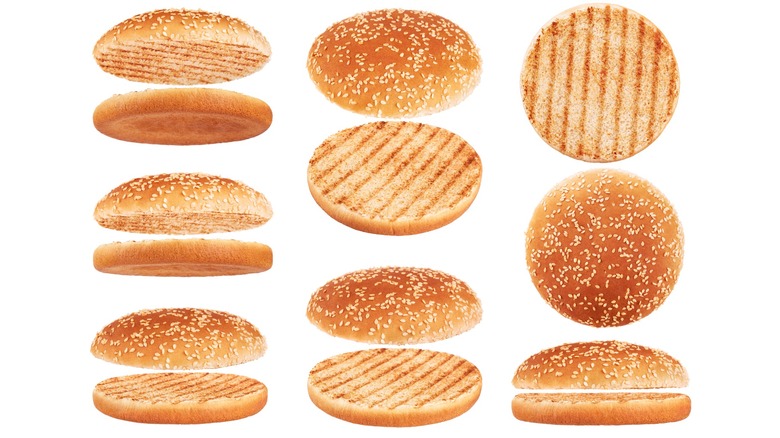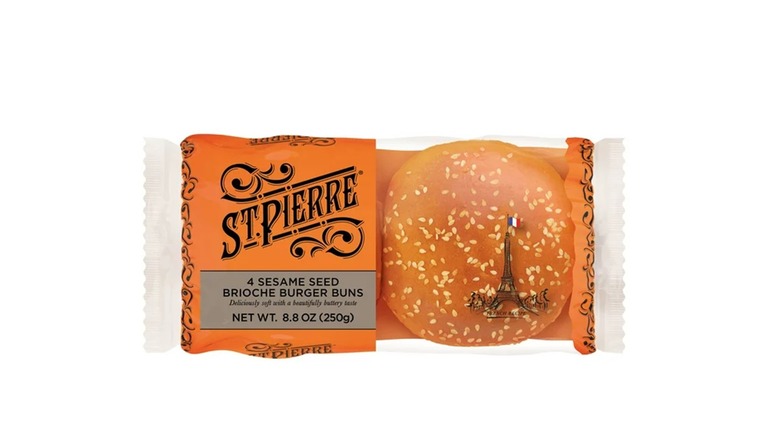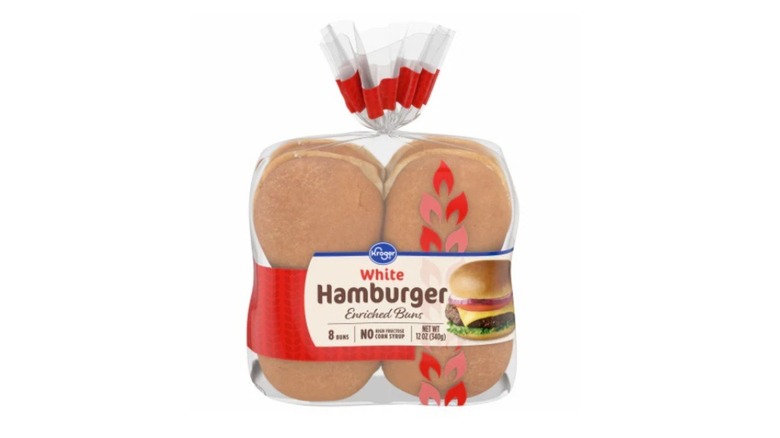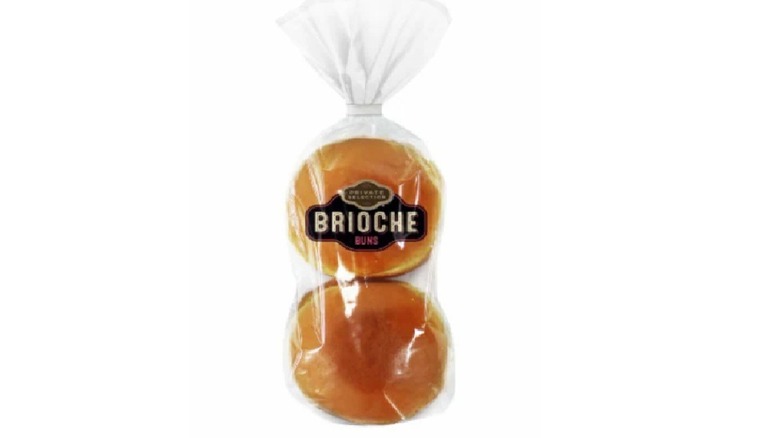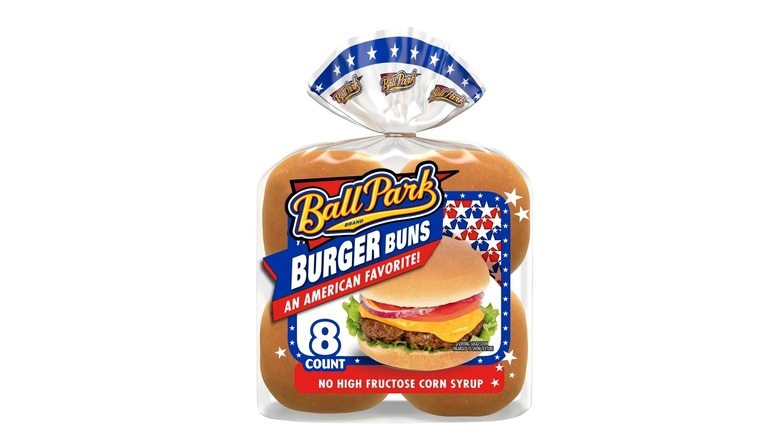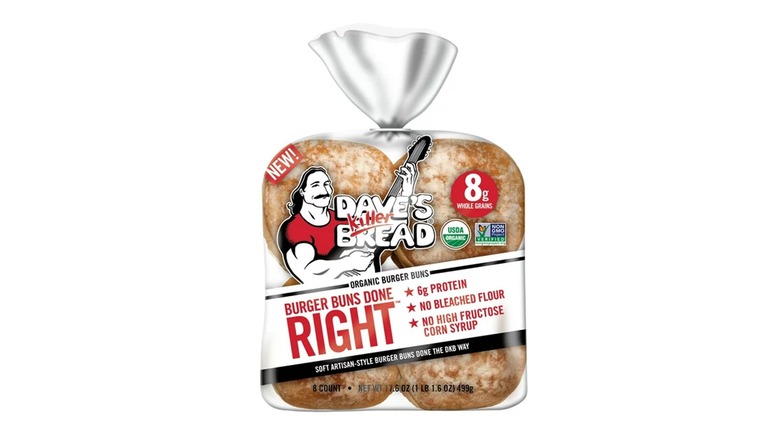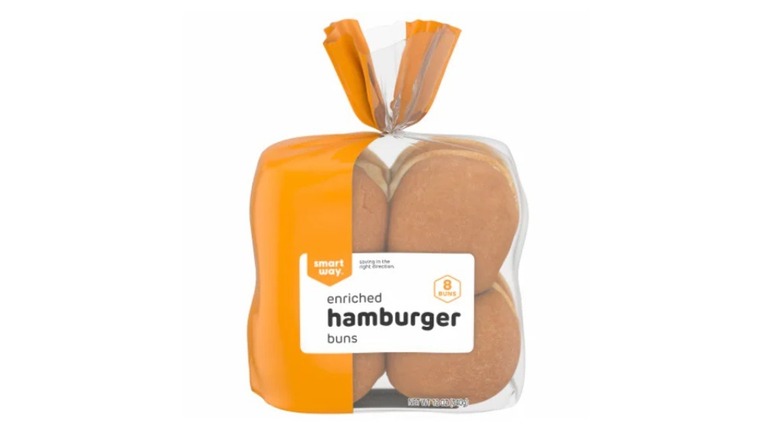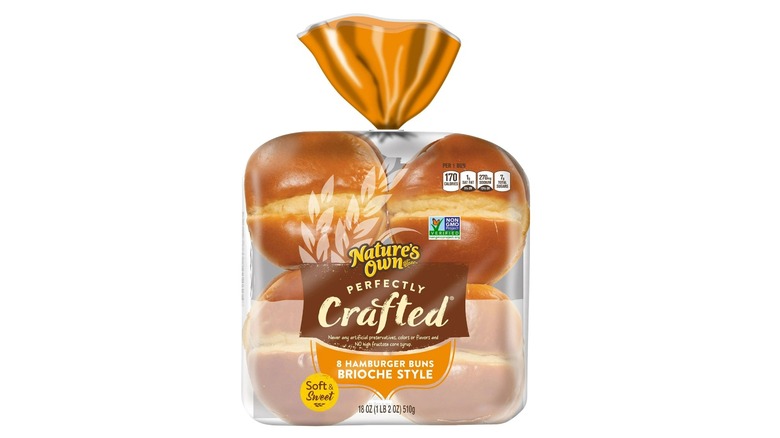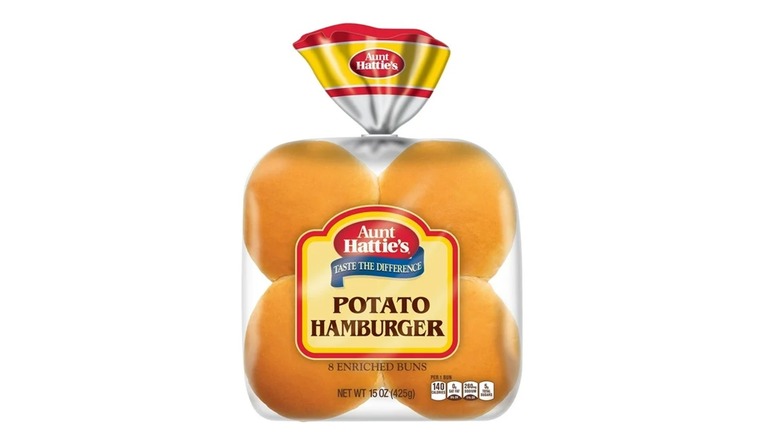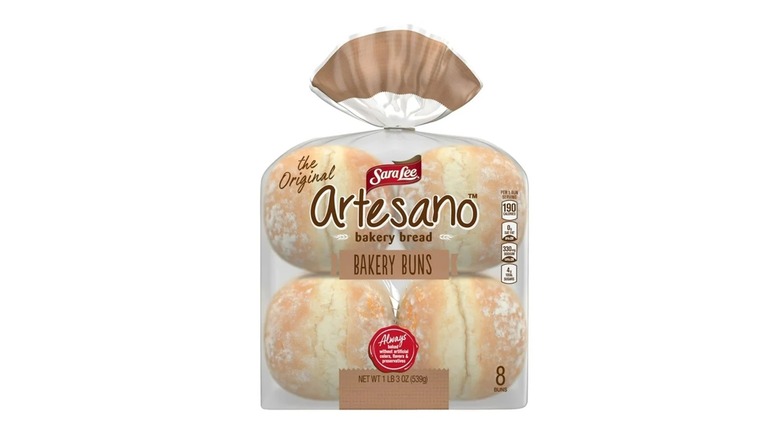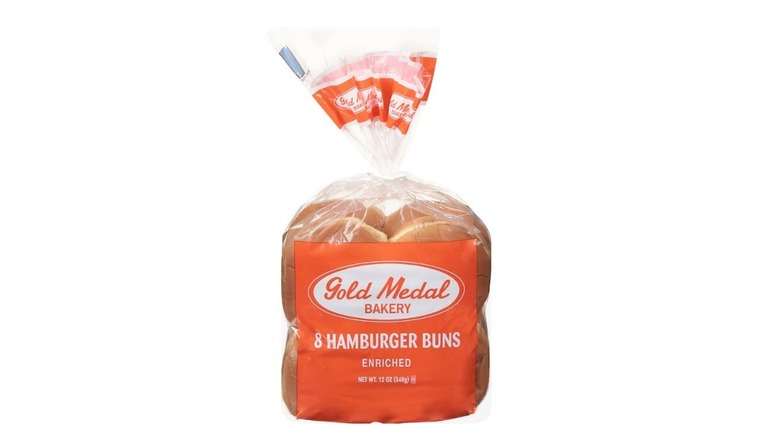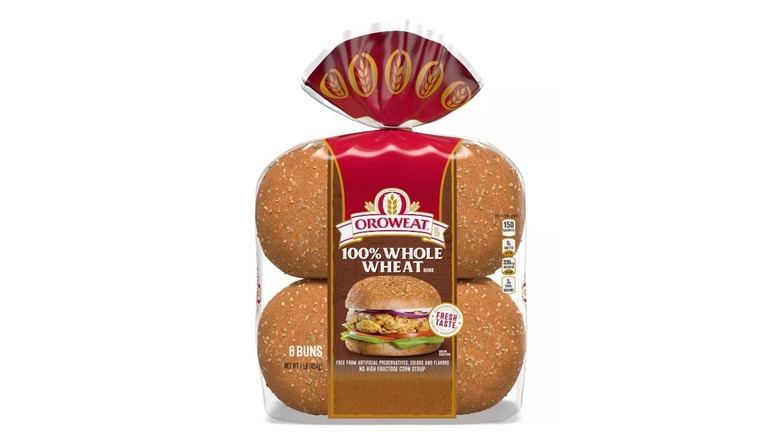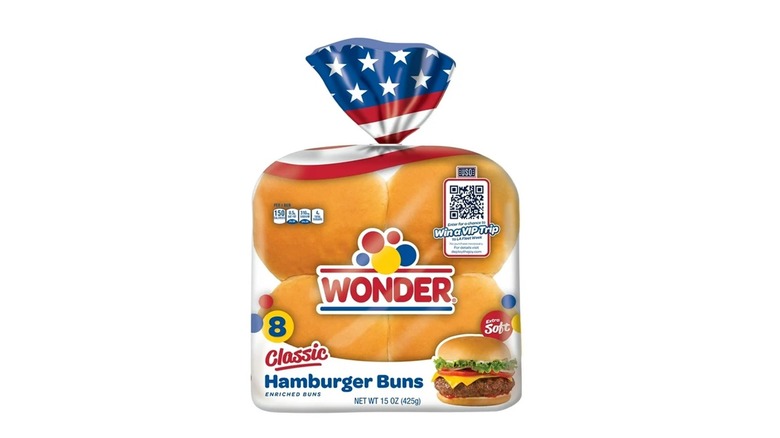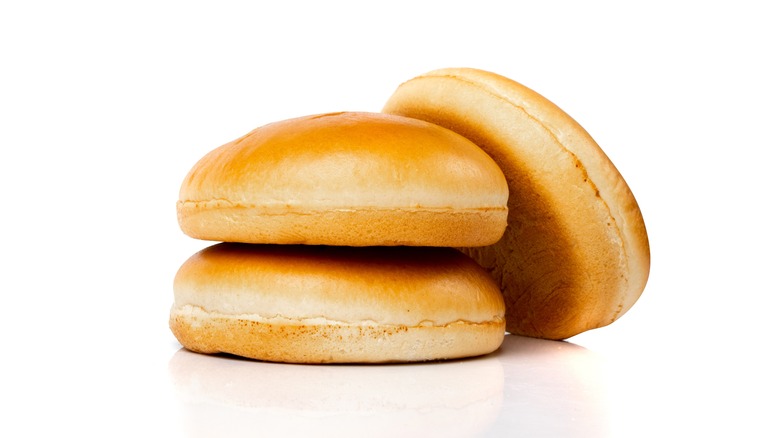Burger Buns Made With The Highest And Lowest Quality Ingredients
We may receive a commission on purchases made from links.
A burger without a bun is like a pencil with an eraser at both ends: What even is the point? Having a soft bread shell serves the dual purpose of giving your perfect burger contrasting texture to add complexity and providing an outer surface that lets you keep your hands clean while you scarf it down. But a trip down the bun section of the bread aisle is all it takes to realize how many burger buns there are in the grocery world vying to hold your restaurant-worthy burger creations — and not every option is made with the highest standards of excellence.
Which burger bun brands utilize the highest quality ingredients and which stick closer to the lower end of the scale? I scoped out the burger bun situation and checked the ingredient lists on a dozen different versions to find out which brands you can trust for an optimum dining experience and which prefer a less thoughtful formula for their creations. With such a limited recipe for making bread (hello flour, salt and yeast!), it might seem like there isn't much a bakery can do to compromise its mindful mix. While they're all thoroughly edible, some buns toss in additives that consumers should be aware of so they can steer clear.
Higher Quality: St Pierre
A French-named burger bun is hardcoded for gourmet greatness, and, thankfully, St. Pierre Brioche Burger Buns uphold the international standard. And if it's a brioche-style bun, it's bound to be a good time at the barbecue. The St. Pierre company prides itself on offering French-faithful bakes to a worldwide audience, which includes keeping the ingredients list lean, clean, and ready to be seen — and eaten.
How pure is the formula St. Pierre uses in its deluxe patty wrappers? Recognizable elements like eggs, butter, skim milk, malted rye flour make the recipe read like a classic French cookbook, but written in English. Yes, there's a bit of "natural" flavoring on the list, something that may give absolute purists cause for pause. But in an industry where multisyllabic chemical compounds sometimes overwhelm the formulation, seeing a majority of actual food substances provide sweet relief for conscious consumers. For those who don't pay such close attention to what's written on the bag, the truth of St. Pierre's burger bun brilliance will surely come through in the taste and texture.
Lower Quality: Kroger
You wouldn't expect the least expensive burger buns on the shelf to be made of high-quality stuff, and you wouldn't be disappointed to know that those expectations prove out at Kroger. The store-label white hamburger buns are soft and delicious, but they also come with preservatives you might rather avoid if you're a bun connoisseur. This isn't surprising when you consider that affordability often translates into providing long-lasting food, which requires a bit of assistance from modern food chemistry. But it bears calling out when scouting for a quality burger clutch.
Two substances that might make you choose a different bag: sodium stearoyl lactylate, which pulls a double shift to create a softer crumb and greater volume while also extending shelf life; and calcium propionate, a preservative that helps ensure your food and your money go as far as possible. Though these are food-safe elements to find on the label, for anyone hoping to consume a more nature-based bun on their burgers, it's a reason to check out other options prior to making the purchase.
Higher Quality: Private Selection
Another Kroger offering, the Private Selection collection comes through in the clutch, delivering a bag of brioche buns that give burgers of all stripes and styles a high-quality resting place. This premium label heightens the creativity and quality of most of its products, and these buns are no exception to the gourmet-level rule. Sure, they're priced higher than the usual store label option, but they're generally more affordable than top name brands, giving selective shoppers a middle alternative that works.
There's a traditional conglomeration of familiar facets in this formula, from wheat flour and sugar to yeast and eggs. Natural flavor makes an appearance, as do mono- and diglycerides, FDA-approved substances that help thicken the dough. But even the colorants in the form of beta carotene and acerola extract are plant-based substances that give the discerning burger diner good vibes about what they're consuming. In an ingredient shout-out that includes 16 items, being able to identify them all gives you a bun you can sandwich your secret recipe burger in with confidence.
Lower Quality: Ball Park
Why is a famous frankfurter producer like Ball Park pushing hamburger buns? Shouldn't Ball Park focus on bread holders for its chief product, the ever-popular Ball Park frank? It seems greedy for this long-lived company to shoulder its way into the burger bun fray. It's up to customers who give these hamburger holders a swing to decide if they're a delicious addition to the Ball Park line-up. But what I found in the pitch for quality ingredients was a wild swing that rings a bit foul.
How far afield does the recipe for these burger-catching mitts sail? You can find chemical preservatives, thickeners in the form of cellulose gum, and DATEM, a dough conditioner that may be food safe, but isn't a requirement in a bun. All of these appear on the list well ahead of sesame seeds, which may come in smaller concentrations in this creation but are a classic element of the burger eating experience, much preferred to a slew of unnecessary additives. In short, you'll be safe eating these, but you probably might not consider a bag on the table to be a home run.
Higher Quality: Dave's Killer Bread
If having nutrient-focused options is your prime concern when shopping for burger buns, Dave's Killer Bread is the pack you're seeking. This health food company's name and mission may sound familiar to fitness fiends who look for whole-food products to nourish their cells and systems. The label on its Burger Buns Done Right announces in starred bullet points the lack of bleached flour and high fructose corn syrup, a brave distinction for a bread company to put front and center, and one that puts its higher quality ingredients on full display.
Not only is the ingredient list a who's who of organic superstars in Dave's artisan-style rolls, it's also a lexicon of entirely recognizable words that all sound like the food they're derived from. Slap a homemade burger on one of these buns and you'll be eating organic flours from wheat, whole wheat, barley, spelt, millet, and quinoa, six grains. You'll also get some organic cane sugar and wheat gluten for sweetness and texture, a bit of sea salt, organic oil and vinegar, plus organic acerola cherry powder to provide color. That's it — no chemistry set of additives or one-off inclusions that make you question your purchase. This is one of the most impressive burger bun labels I could find, and its high quality speaks for itself.
Lower Quality: Smart Way
Smart Way may be a budget-friendly bunch of burger buns, but this bottom-shelf possibility includes a selection of shelf stabilizers that doesn't exactly speak of high quality. It's about what you'd expect from a no-frills burger jacket, which is fantastic if you know what you're getting and you're okay with going lower quality for a lower price. Kroger may make it easy to afford buns for your birthday shindig, but trusting the quality of the ingredients is a different story.
The first four items on the list are a burger bun slam dunk: enriched flour, water, sugar, and yeast, which are all it takes to make bread in its most basic form. The next few elements introduce soybean oil, wheat gluten and salt, forgivable additions that help with flavor and texture. It's the next five components that give the bag a questionable twist: sodium stearoyl lactylate, calcium sulfate, ammonium sulfate, ascorbic acid, and calcium propionate, a quintet of conditioners and preservatives that keep the buns fresh and mold-free, but also complicate the whole-food aspect of what should be a simple bread product.
Higher Quality: Nature's Own Brioche
Nature's Own gives burger lovers a brioche bun made of high-quality ingredients that's sure to cradle their patties with tender care. The bread producer has been mastering the art of a perfect bake, coming up with rolls, loaves, and buns that address the tastes of the modern consumer. So when searching for a more nutritious version of a burger bun, it's nice to find a company that favors natural ingredients and doesn't skimp when it comes to offering quality rolls to stack on your holiday table.
You won't find artificial colors, preservatives, or colorings in this bag of burger catchers. Though the ingredient list is a bit more involved than some of the simpler high-quality brands, nearly every ingredient is a food you can identify, from wheat and malted barley flour to butter to vegetable oil. Using annatto and turmeric to achieve a more even hue provides plant-based colorants that maintains the company's weird-ingredient-free credo. There are sensitivity warnings for wheat, milk, and sesame, which means these buns won't be for everyone's burgers. But if they're an option for you, you can rest easy with Nature's Own joining the party.
Lower Quality: Aunt Hattie's Potato Buns
It isn't the dehydrated potato flakes in Aunt Hattie's Potato Buns that call out the low-quality nature of this selection; they're commonly used as a starchy element in baking, promoted by brands like Bob's Red Mill as an addition to yeast bread recipes that utilize potatoes. Even Krispy Kreme used them to achieve fluffy donuts when the company started up. For making fluffy rolls destined to dance with your best burger, potato flakes are actually a favorable element. Plus, they're part of the name, so it's not a shock to find them factoring in the formula.
No... it's the inclusion of high fructose corn syrup that catches the eye on the ingredients list and doesn't let go. Sweetening bread may be a traditional way to add flavor and activate yeast, but this gloopy factory food additive isn't the best way to do it. After the corn syrup spell is broken, there's the possibility of having an unidentified combination of conditioners and preservatives in each bun that makes consuming a single Aunt Hattie's burger holder a less desirable prospect, let alone trying to work through an eight-pack. With quality this dubious, it's best to stick with other bags.
Higher Quality: Sara Lee Artesano
Oh yes, sweet Sara Lee knows how to come through in a pinch with a specialty burger bun that turns your backyard brouhaha into a full-fledged gala. With Sara Lee Artesano rolls as part of your suppertime selections, you have a jewel box of a burger bun that takes the ingredient quality high road. Rather than decrypting a list of strange mix-ins that might sound like a Hogwarts incantation, you can run your eyes along a list of wholesome elements that make bread sound like an elegant affair.
How pure is this blend? Beyond the enriched wheat flour, you'll find water, sugar, yeast and sea salt, plus a bit of soy lecithin, which serves as an emulsifier and preservative but is plant-derived and easily recognized among the other food-friendly components. Those with soy allergies will want to steer clear, but that doesn't lessen the high-quality nature of the ingredients Sara Lee chooses for these artisan rolls to adorn your ground beef burgers and veggie patties. The texture and taste are proof positive that using favorable ingredients can provide top-notch burger bun moments with a more gourmet character.
Lower Quality: Gold Medal
This Gold Medal isn't the company that makes flour other people use to make bread; this one produces its own catalog of baked goods that include hamburger buns. They appear to be exclusively sold through Dollar Tree, providing customers in search of a bargain a bag of fairly-priced wrappers to stash their patties in. The prospect of saving cash to spend on the meat for the bread sounds like a decent deal, considering the high cost of putting together a summer party or a tailgating extravaganza.
If you want your guests to have high-quality ingredients in their burger bread, Gold Medal shouldn't be your first-place choice. The inclusion of guar gum for thickening, conditioners to make the dough more favorable, calcium sulfate for drying and calcium propionate as a preservative make these buns sound more like a science experiment than a dinner food. Even at the super-sweet price of $1.25, Gold Medal is a brand you should give deeper consideration if having wholesome burger grabbers you can enjoy without second guessing the contents of the bag is high on your list of party plans.
Higher Quality: Oroweat
A list of ingredients you can read and recognize without consulting a dictionary or running for Google? Hot dog! Or hamburger, as the case may be for these top-quality patty grippers. And Oroweat is just the national bread brand to bring them to your cookout, in whole wheat form. It wasn't surprising to know that this long-lived company was still producing dependable bread products to include in your block party spread. But it was reassuring to affirm that the high-quality philosophy extends to burger buns.
A lucky list of 13 entirely recognizable and thoroughly wholesome ingredients makes up the blueprint for these high-quality buns, a collection that reads like culinary poetry. Whole wheat flour, vegetable oil, wheat bran, and grain vinegar are among the most prominent players here, with citric acid appearing to be the only preservative. You'll want to eat them before they have a chance to deteriorate, but the best burger buns are the ones that exit the party the quickest thanks to their high-quality ingredients. Oroweat looks to be chief among them.
Lower Quality: Wonder Bread
If you're wondering whether Wonder Bread carries its reputation for sub-par though melt-in-your-mouth delicious white bread to the burger bun game, the answer is a resounding "of course." Wonder Bread is often used as a slam to indicate something bland that has little or no discernible character, which may be a little harsh. But after reading the ingredients in the company's take on burger buns, it's easy to understand how the reference came to be.
What calls out the low-quality Wonder Bread ingredients most vociferously? Maybe it's the parenthetical reference to 11 different dough conditioners and additives, a list that reads more like a shampoo bottle than a burger bun bag. And the section before it that reads "Contains one or more of the following" doesn't do much to settle the hearts and minds of diners who like to know what's in the bread they're eating. Isn't it possible for Wonder Bread to at least narrow down the strange inclusions they've used in their hamburger holsters? If a food producer makes generalizations like these, it's best to find another brand to cradle your cheeseburger — one that discloses a more honest version of its recipe.
Methodology
The general formula for bread — wheat, salt, leaveners — is a natural mix for burger buns as well; these rolls are simply white or wheat bread in a different shape. But there are recipes for bread that take quality into consideration, while others emphasize shelf stability and long-lasting freshness. The distinction helped me determine which burger buns included a suite more natural ingredients such as sugar instead of corn syrup and which companies compromise a bit by using flavorings and chemical additives that may be food-safe but aren't necessarily considered high quality ingredients.
There's no fault in companies using additives to make their burger buns more enjoyable or longer-lasting; it's a common practice in food production in general, and with bread being extremely perishable, it's a wise strategy for making it go as far as possible. But understanding that some bun producers are capable of offering a purer creation that uses more thoughtful ingredients gives shoppers a choice for their special occasions or nightly dinners. My aim here is to call out which burger buns fall into both categories to make readers aware of their options.
